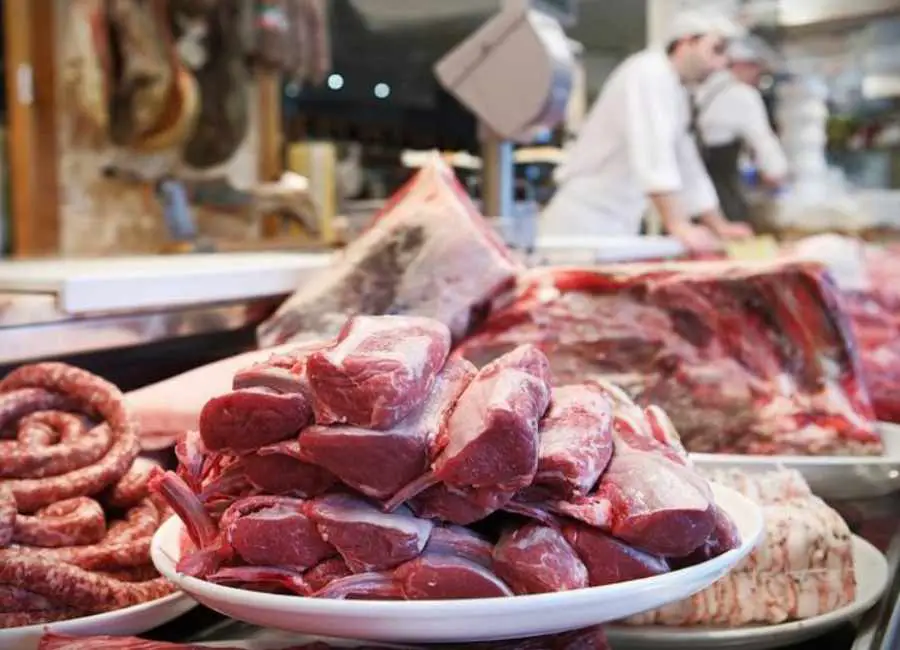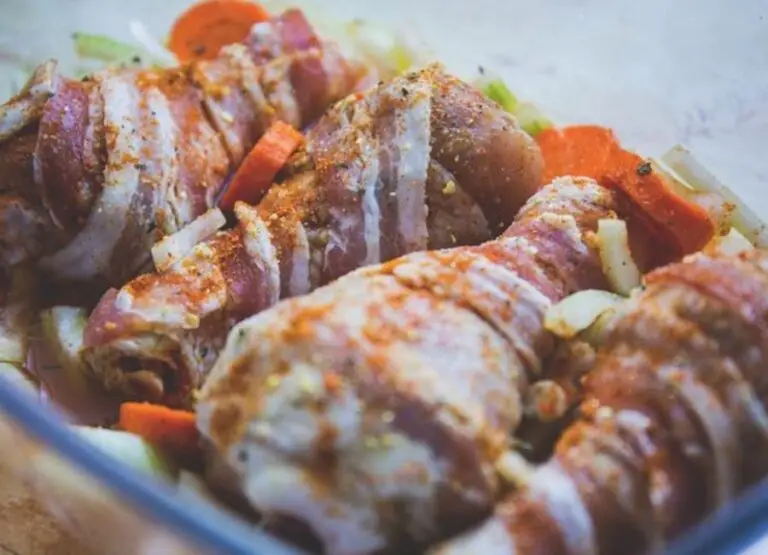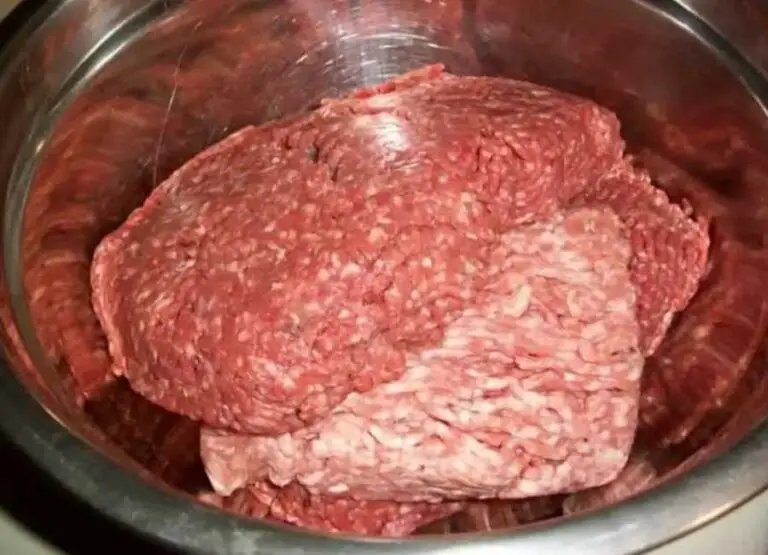Can Raw Meat Give You Salmonella (Answered)
People always ask can raw meat give you Salmonella and in this article, we will be discussing how you can get Salmonella from eating raw meat.
Raw meat is a great source of protein and healthy fats, but it can also carry bacteria. Salmonella, for example, is one of the most common foodborne illnesses.
This article will teach you how to tell if the raw meat you are buying is safe or not so you can protect your health.
Can Raw Meat Give You Salmonella?
Yes, contaminated raw meat can give you Salmonella infection owing to cross-contamination, poor hygiene, and the spread of germs to other foods, utensils, and surfaces. If the host animal has Salmonella in its intestines, it can also pass it on to you.
This pathogen can live in raw poultry, pork, beef, eggs, or other foods that are made from these products.
It may not show symptoms for days or weeks after you’ve eaten the contaminated product.
And if your immune system is weak because of a chronic illness or antibiotic use, you’re at higher risk for serious complications.
What is Salmonella?
Salmonella is a kind of bacteria that mostly lives in the intestine, particularly a serotype that causes food poisoning.
Salmonellosis is a bacterial infection that may be contracted by ingesting contaminated food products such as raw chicken, eggs, meat, and, in certain circumstances, fruits and vegetables.
Handling pets, particularly birds and reptiles, might also expose you to salmonella.
What are the symptoms of Salmonella?
Salmonella causes gastroenteritis, often known as stomach flu, a moderate to severe gastrointestinal infection.
According to the CDC, symptoms usually appear six hours to six days after contact with the bacterium.
Common symptoms of Salmonellosis include:
- Nausea and vomiting
- Loss of appetite
- Headache
- Diarrhea
- Abdominal cramps
- Fever
- Dizziness
- Blood in your stools
What can raw meat give you?
Raw meat is packed with lots of nutrients and that is why most animals like dogs, cats, and even humans eat raw meat.
Raw meat contains enzymes that could help in digestion, these enzymes are destroyed during cooking or processing.
Here are some of the major nutrients raw meat can get you:
- Protein
- Iron
- Vitamins
- Zinc
- Copper
- Fat
- Potassium
- Sodium
- Cholesterol
- Phosphorus
- Magnesium
Raw meat can also transfer some pathogens that can get you sick if not properly handled or if there is any form of cross-contamination.
Here are some of the major pathogens you can get from eating contaminated raw meat:
- Salmonella
- Campylobacter
- E. coli
- Clostridium perfringens
- Enterococcus
- Staphylococcus aureus
- Shigella
- Klebsiella
Why raw meat can give you Salmonella
Raw meat is a product of living animals, and you barely have control of when and how they can get Salmonella.
For example, turkey can pick up Salmonella from picking up food that is dropped from the feeding cans.
Salmonella most of the time remains in the gut of the turkey, and when you kill and process it, the turkey can transfer the Salmonella to you.
However, 90% of the time you get Salmonella it is due to bad hygienic practices, which you should have taken care of.
So, an animal infected with Salmonella pathogens can easily be transferred to you if you persist in eating raw meat.
Can you get sick from Salmonella-contaminated raw meat?
We all know that raw meat is unsafe to eat, but did you know that it can also make you sick?
Raw or undercooked meat is a major risk for foodborne illness.
The Centers for Disease Control and Prevention (CDC) rate it as one of the biggest threats to public health in the United States.
There are many types of salmonella bacteria from which you could become infected.
Symptoms include diarrhea, fever, stomach pain, and vomiting, among others.
The CDC recommends thorough cooking of any meat product. This will kill any harmful bacteria that may be present.
If you have a pet at home who has been exposed to raw meat products, wash their paws and put them in a carrier for 24 hours after exposure to prevent them.
Eating raw meat that is infected with Salmonella pathogens will 100% make you sick.
How to prevent contamination of raw meat by Salmonella
There are ways you can prevent contamination of raw meat by Salmonella, which are as follows:
Utensils
It is essential to keep your kitchen clean in order to avoid foodborne diseases.
Clean the surfaces of cabinets as well as the pan in which the chicken or turkey will be cooked, as this will aid in the battle against numerous bacteria.
It’s also a good idea to avoid washing the meat because bacteria might be present in and around the sink.
Raw Meat Storing
It’s critical to keep chicken and turkey cuts correctly once they’ve been purchased.
When you go home from the supermarket, ensure sure the meat is in a clean, sealed container.
Juices from raw chicken or turkey will not spill onto other foods in the fridge if the container is placed at the bottom of the fridge.
When freezing raw meat, do it as soon as possible after placing it in a dry, clean container.
Preparing Raw Meat
When the raw meat is out from the butcher, make sure to use a clean cutting board and kitchen utensils devoted to just too raw meat to avoid cross-contamination with other meals.
The most important approach to avoiding illness is to wash your hands often.
Wash your hands always 20 seconds after the raw beef, chicken, or turkey is processed with warm water and soap.
Best Practices to Avoid Contamination of Raw With Salmonella
Wash your hands frequently to avoid raw meat poisoning.
Food should also be prepared and stored safely. Always wash your hands after using the restroom. Here are safe ways to prevent infection from raw meat.
Keep your hands clean after any of the following:
- Blowing your nose
- Coughing or sneezing
- Touching animals
- Using the toilet
- Changing diapers
- Smoking
When dealing with raw meat, be sure to keep the following in mind:
- Before and after using to make meals, all utensils and surfaces should be cleaned with warm soapy water.
- To sterilize surfaces and utensils, combine one quart of water with one teaspoon of bleach.
- Before and after handling raw meat, poultry, shellfish, fish, eggs, or produce, wash your hands with warm soapy water for at least 20 seconds.
- When chopping fresh fish, poultry, or meat, use plastic cutting boards. They’re also easy to clean.
- Before eating, cook chicken, meat, and eggs for the proper length of time.
- Raw meat, poultry, and fish, as well as their fluids, should be kept separate from other meals.
- To ensure that meals are cooked to the correct internal temperature, use a meat thermometer.
When preserving raw meat, make sure to keep the following in mind:
- Refrigerate or freeze raw meat as soon as possible.
- Consider them hazardous to eat if they have been at room temperature for more than 2 hours.
- Refrigerators should be adjusted at 40 degrees Fahrenheit or lower. Preset the freezers to 0°F.
- Keep raw meat and raw eggs away from fruits and vegetables, cooked foods, and prepared foods.
- If you don’t know how long anything has been out of the fridge, throw it out.
- If you’re not sure if anything is harmful, throw it out.
Raw Meat And Salmonella Risk Factors
It can be particularly dangerous in children, the elderly, and those with weak immune systems.
Raw meat products are one of the most common sources of Salmonella contamination.
However, not all raw meat products are unsafe to eat.
Salmonella resides in the intestines of people and other animals and can be passed out through excrement.
When someone touches or eats something contaminated with feces, the germs can infect them.
Infection with salmonella bacteria is commonly caused by contaminated meat, food, or water.
People with compromised immune systems, such as older adults, babies, and people with AIDS, are more likely to have severe cases.
Yes, you can get Salmonella from eating raw meat that is infected with Salmonella pathogens.
Why you should be afraid of raw meat
You should be afraid of raw meat because raw meat can transfer deadly pathogens to you if you don’t properly process it before eating it.
Raw meat can transfer the following pathogens to you when you don’t properly handle it or when you decide to continue eating raw meat.
- Salmonella
- Campylobacter
- E. coli
- Clostridium perfringens
- Enterococcus
- Staphylococcus aureus
- Shigella
- Klebsiella
All the above-listed pathogens will hurt you and can kill you if not properly treated.
Can raw meat make you sick?
Because of cross-contamination, poor hygiene, and the transfer of germs to other foods, utensils, and surfaces, infected raw meat can make you sick.
This is because pathogens like Salmonella can be passed on to you if the host animal has it in its intestines.
How Can I Prevent Infection From Raw Meat?
Some ways to prevent infection from raw meat are as follows:
- Do not eat any raw meat that you did not know its source.
- Do not eat frozen raw meat.
- Avoid cross-contamination
- Do not refreeze raw meat.
- Keep utensils for processing raw meat clean.
- Do not buy raw meat from the roadside.
- Get your raw meat from a reputable butcher.
- Avoid undercooked meat
General Guidelines To Avoid Food Poisoning
Hands and surfaces like cutting boards and counters should be washed often, and fruits and vegetables should be rinsed under running water.
To prevent cross-contamination, use a different cutting board for raw meat, poultry, and shellfish and keep these items separate from other foods.
Cook to destroy germs, and ensure that food is cooked to the correct internal temperature.
Keep your refrigerator temperature at 40 degrees Fahrenheit or below, and never keep perishable food out of the fridge for more than two hours.
Thaw frozen foods in the refrigerator or microwave, since leaving them out on the counter to thaw might allow germs to proliferate quickly.
Can I get salmonella from raw steak?
Yes, contaminated raw steak can give you salmonella, however, raw steak is only safe when properly handled, because it can lead to foodborne disease through consumption of germs such as Salmonella, Escherichia coli, Shigella, and Staphylococcus aureus.
Can you tell if meat has salmonella?
There’s no way to tell during the salmonella incubation period, but when salmonella starts showing up, you’ll most likely feel it in your lower abdomen, along with some cramps. Salmonella symptoms such as nausea and vomiting are also very prevalent.
What type of raw meat causes salmonella?
The Bacteria Salmonella is frequently transmitted through contaminated raw meat and undercooked meat, such as chicken, turkey, duck, beef, veal, and hog, which are the common causes of salmonella illness.
My Conclusion On Can Raw Meat Give You Salmonella
Salmonella is a type of bacteria that can cause food poisoning.
You might have eaten salmonella if you’ve had diarrhea, fever, stomach cramps, and vomiting.
It can make you feel really sick and stay in your body for up to a week.
Salmonella is found in raw meat such as beef, chicken, lamb, pork, and veal.
Raw eggs can also contain bacteria.
To avoid infection from raw meat and eggs while cooking them properly, use a digital kitchen thermometer to measure the internal temperature to at least 165 °F (73 °C).
Read more about meat:
- Can Raw Meat Kill You: 9 Top Raw Meat Dishes.
- Can Raw Chicken Kill You: Risk Factors You Should Know.
- 10 Most Unhealthy Meat & 5 Most Healthy Meat.
References:





![Are Sausages Good For You [Useful Hints]](https://foodcreeks.com/wp-content/uploads/2023/02/Are-Sausages-Good-For-You-1-768x555.jpg)
![Can You Get Sick From Eating Old Hot Dogs [Hints]](https://foodcreeks.com/wp-content/uploads/2023/05/Can-You-Get-Sick-From-Eating-Old-Hot-Dogs-768x555.jpg)
![Can Freezer Burned Meat Be Eaten [Answered]](https://foodcreeks.com/wp-content/uploads/2023/02/Can-Freezer-Burned-Meat-Be-Eaten-768x555.jpg)
